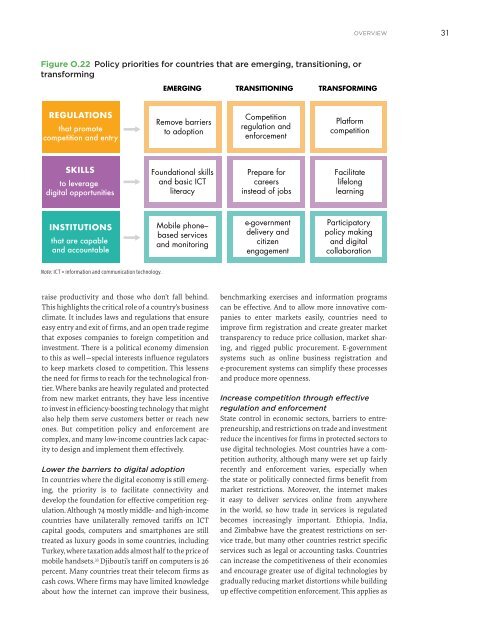Authorized Authorized
eERqs
eERqs
Create successful ePaper yourself
Turn your PDF publications into a flip-book with our unique Google optimized e-Paper software.
OVERVIEW<br />
31<br />
Figure O.22 Policy priorities for countries that are emerging, transitioning, or<br />
transforming<br />
EMERGING TRANSITIONING TRANSFORMING<br />
REGULATIONS<br />
that promote<br />
competition and entry<br />
Remove barriers<br />
to adoption<br />
Competition<br />
regulation and<br />
enforcement<br />
Platform<br />
competition<br />
SKILLS<br />
to leverage<br />
digital opportunities<br />
Foundational skills<br />
and basic ICT<br />
literacy<br />
Prepare for<br />
careers<br />
instead of jobs<br />
Facilitate<br />
lifelong<br />
learning<br />
INSTITUTIONS<br />
that are capable<br />
and accountable<br />
Mobile phone–<br />
based services<br />
and monitoring<br />
e-government<br />
delivery and<br />
citizen<br />
engagement<br />
Participatory<br />
policy making<br />
and digital<br />
collaboration<br />
Note: ICT = information and communication technology.<br />
raise productivity and those who don’t fall behind.<br />
This highlights the critical role of a country’s business<br />
climate. It includes laws and regulations that ensure<br />
easy entry and exit of firms, and an open trade regime<br />
that exposes companies to foreign competition and<br />
investment. There is a political economy dimension<br />
to this as well—special interests influence regulators<br />
to keep markets closed to competition. This lessens<br />
the need for firms to reach for the technological frontier.<br />
Where banks are heavily regulated and protected<br />
from new market entrants, they have less incentive<br />
to invest in efficiency-boosting technology that might<br />
also help them serve customers better or reach new<br />
ones. But competition policy and enforcement are<br />
complex, and many low-income countries lack capacity<br />
to design and implement them effectively.<br />
Lower the barriers to digital adoption<br />
In countries where the digital economy is still emerging,<br />
the priority is to facilitate connectivity and<br />
develop the foundation for effective competition regulation.<br />
Although 74 mostly middle- and high-income<br />
countries have unilaterally removed tariffs on ICT<br />
capital goods, computers and smartphones are still<br />
treated as luxury goods in some countries, including<br />
Turkey, where taxation adds almost half to the price of<br />
mobile handsets. 33 Djibouti’s tariff on computers is 26<br />
percent. Many countries treat their telecom firms as<br />
cash cows. Where firms may have limited knowledge<br />
about how the internet can improve their business,<br />
benchmarking exercises and information programs<br />
can be effective. And to allow more innovative companies<br />
to enter markets easily, countries need to<br />
improve firm registration and create greater market<br />
transparency to reduce price collusion, market sharing,<br />
and rigged public procurement. E-government<br />
systems such as online business registration and<br />
e-procurement systems can simplify these processes<br />
and produce more openness.<br />
Increase competition through effective<br />
regulation and enforcement<br />
State control in economic sectors, barriers to entrepreneurship,<br />
and restrictions on trade and investment<br />
reduce the incentives for firms in protected sectors to<br />
use digital technologies. Most countries have a competition<br />
authority, although many were set up fairly<br />
recently and enforcement varies, especially when<br />
the state or politically connected firms benefit from<br />
market restrictions. Moreover, the internet makes<br />
it easy to deliver services online from anywhere<br />
in the world, so how trade in services is regulated<br />
becomes increasingly important. Ethiopia, India,<br />
and Zimbabwe have the greatest restrictions on service<br />
trade, but many other countries restrict specific<br />
services such as legal or accounting tasks. Countries<br />
can increase the competitiveness of their economies<br />
and encourage greater use of digital technologies by<br />
gradually reducing market distortions while building<br />
up effective competition enforcement. This applies as


